Have you ever wondered why certain YouTube channels always get a million views in a short period of time and go viral with their content on a regular basis?
The truth is that they understand how the platform works and use it to make it easier for people to find their content quickly.
In fact, they know the right keywords to use in their video descriptions and titles that make it simple for someone looking for information on a particular topic to find them in a flash.
The good news?
You can use these same techniques, too. And that’s what this guide will teach you.
Of course, you could just continue to toss your videos up on your channel and hope for the best, but learning YouTube SEO is a surefire way to improve your results and reach more viewers.
Here’s what you need to know about YouTube keyword research and how doing it the right way can help you get more views on your channel.
Download this post by entering your email below
What’s the Difference Between SEO and YouTube SEO?
You’re probably thinking that what we just described sounds an awful lot like search engine optimization (SEO).
And you would be absolutely right. The two concepts of YouTube SEO and traditional SEO are closely related. But you have to step away and think of YouTube as something separate from Google or Bing.
It technically is a search engine, but just for videos instead of regular content.
And that means it has a separate set of best practices that video creators need to learn, adopt, and implement for the best possible results.
By doing this, you’ll make it easier to show up in search results on YouTube, leading to a steadier flow of traffic and an increased number of video views.
Makes sense, right? But that’s not all.
It is also important to recognize that Google places a high emphasis on YouTube content in search engine results.
Not a far stretch, considering the search engine giant owns the major video content platform.
By ensuring your videos are optimized with proper keywords, titles, and descriptions, you can help them rank higher on search engines outside of YouTube, too.
What is a YouTube Keyword?
A YouTube keyword is essentially the same as any other keyword.
It’s a single word or phrase that explains what a particular video is going to be about.
What’s even more important is that it closely matches what viewers are typing in the search box to look for when they’re in need of content on a specific subject.
That’s why doing your research ahead of time and creating content around a specific focus keyword is so important.
Once you know what your target market and the audience want to see, you can tailor your video toward their needs.
In the end, this leads to:
- A higher number of page views.
- More likes.
- More subscribers.
- And a better response to your overall channel.
In fact, we could even dare to say that YouTube keyword research is so important that it really is the cornerstone of your success when creating a successful YouTube channel.
What is YouTube Keyword Research?
YouTube keyword research is all about figuring out which keywords and phrases YouTube users search to find related videos on the platform.
Leveraging the right keywords in your web content helps ensure it gets found by the right people, and this is just as much the case on YouTube as it is anywhere else.
How Does Keyword Research on YouTube Help You Get More Views?
So, how does keyword planning effectively help improve traffic to your channel?
Researching what people are actually looking for in regards to the topic you’re creating a video about is essential in making sure viewers can actually find it.
After all, let’s face it.
With over 500 hours of new content being uploaded to YouTube every minute, there’s no possible way to watch everything at once.
That means your audience has to be picky about what they’re consuming on the platform.
When you’ve taken the additional time to match your videos up to their needs with keyword research, you’re making it easy to get in front of them and ensure your content is showing up ahead of another channel.
More importantly, you’re also guaranteeing it is clear that you’re giving them the best information or entertainment they’re looking for.
When they can easily see what your videos are about by a clearly labeled title or an accurate description, they don’t have to waste time trying to figure out what you’re offering.
In the end, this can help you get more views and really build an audience that truly cares about the information you’re sharing.
YouTube Keyword Research: How to Find the Best Keywords for YouTube?
Now that you know why YouTube keyword research is important, let’s dive into how the process happens.
Here are a few of the key steps you’ll want to follow to ensure you’re getting the right keywords for your topic and audience.
1. Pick a topic
The first step in finding the right keywords for your YouTube video content is to select a topic.
While it might seem counterintuitive to do this before the research portion, the whole idea is that you want to have a starting point.
Keep your topic fairly broad, but make sure it is something you know your audience is going to want to learn about — and also an idea that you could accurately create a video about.
2. Check YouTube’s autocomplete feature
The next thing you’ll want to do when performing YouTube keyword research is to check YouTube’s autocomplete feature.
Often, this will give you an idea into what people are searching for and how it relates to the topic you’re looking to cover in your video.
If there is an oversaturation of content or it doesn’t seem to be something with an autocomplete response, then you might want to evaluate whether the topic is worth pursuing.
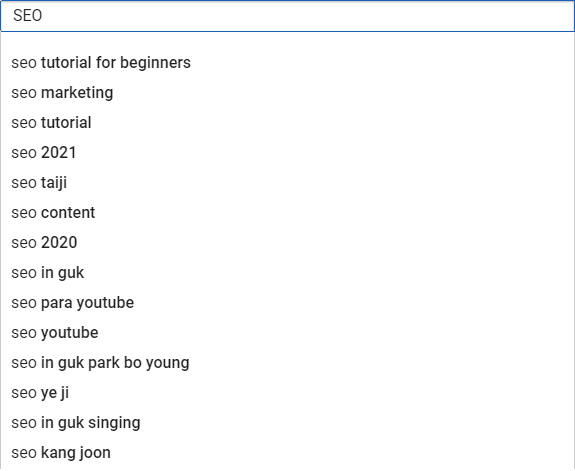
3. Check out the competition
Once you have a good idea about the topic and how well it is already covered on YouTube, take a look at a few of the videos that have a large amount of traffic.
What keywords are they using? Are there any that surprise you?
Take note of the ones that make the most sense for the type of video content.
4. Use a YouTube keyword research tool
Now that you’ve analyzed what is already on the platform, it is time to use a YouTube keyword research tool to finalize your primary and secondary keywords.
How you use these tools varies by the one you’ve chosen, but the main point to remember is that you’re looking for words and phrases that closely relate to the topic your video covers.
Find those that have a high average number of views or subscribers to narrow down your list to five or ten.
What are the 10 Best YouTube Keyword Tools?
Finding the best YouTube keywords starts by knowing what tools are out there to make the process easier. Here are a few to consider trying out to make your research process easier.
1. YouTube Analytics
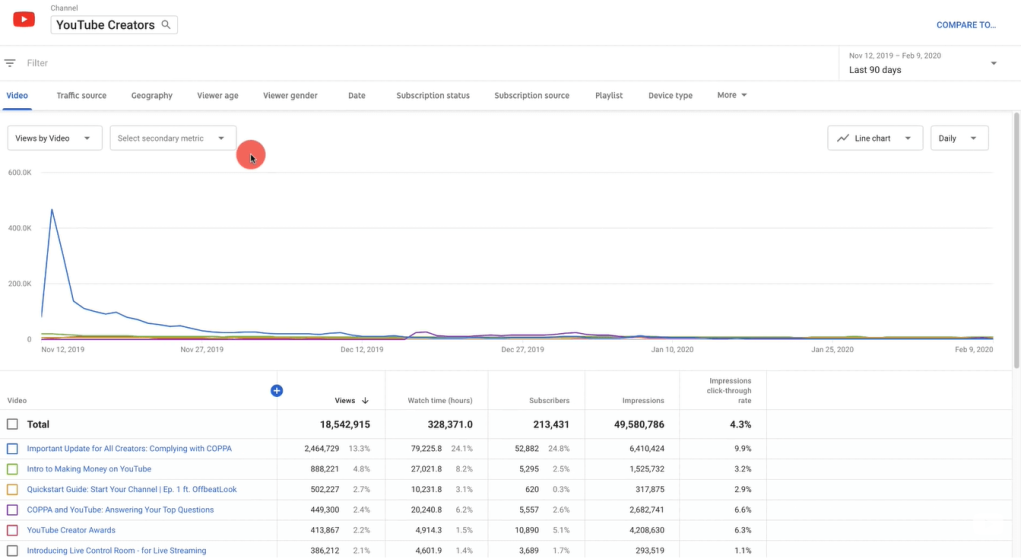
The first place to start when it comes to figuring out search intent is YouTube Analytics.
Often, this will give you ideas on what your existing audience is doing and what they want to see in future videos.
From there, you can base the rest of your keyword research on similar topics.
2. Google Trends
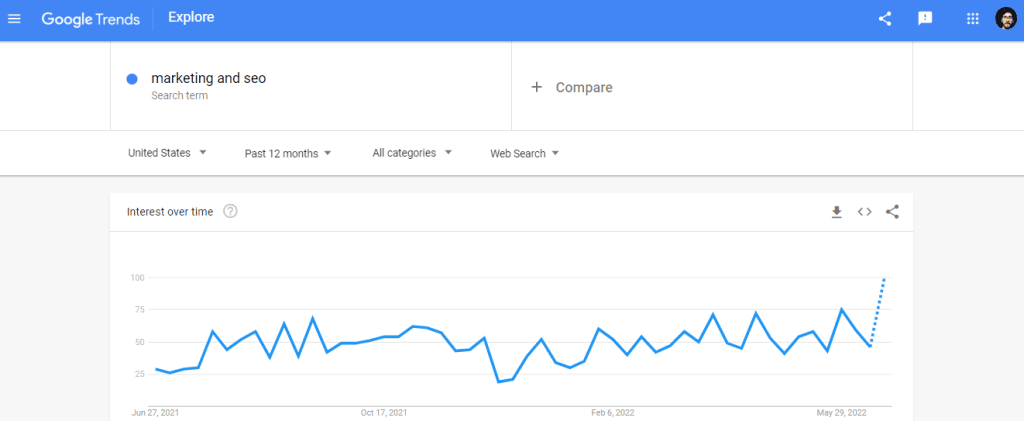
Most video creators don’t realize that Google Trends has a special tab just for YouTube content.
This will give you an idea of how popular a particular topic is and any associated searches related to that subject.
This is great if you’re doing keyword research, as it gives you an idea of what related keywords to search to pair with the ones you’re already using.
3. Google Ads Keyword Planner
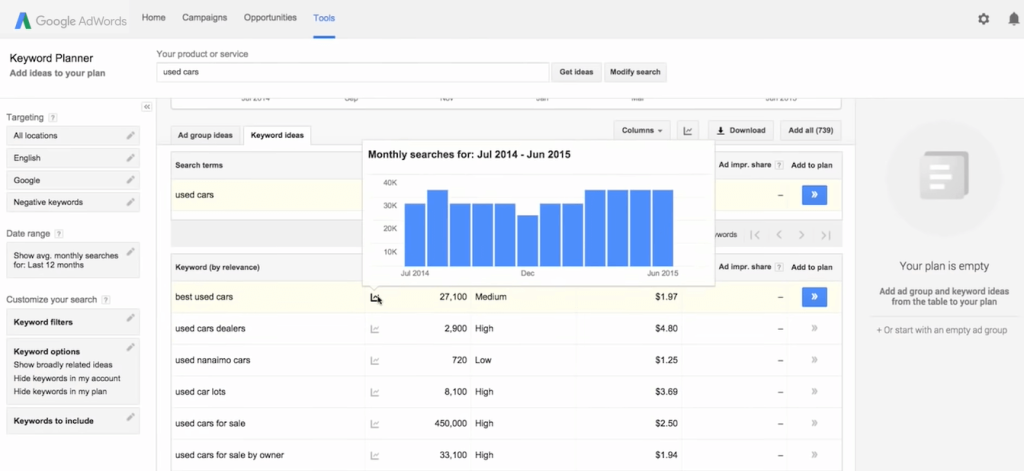
Now, we know Google Ads Keyword Planner is a general SEO tool and not necessarily just for YouTube.
But remember when we mentioned that there’s quite a bit of crossover from general Google search and the video platform?
By making sure there are enough people searching for your keywords, you can aim to create videos that will show up in general search, which still equates to a broader audience and more views.
Plus, it’s free to use, which is great if you’re just starting out or on a strict budget.
4. BuzzSumo Keyword Research Tool
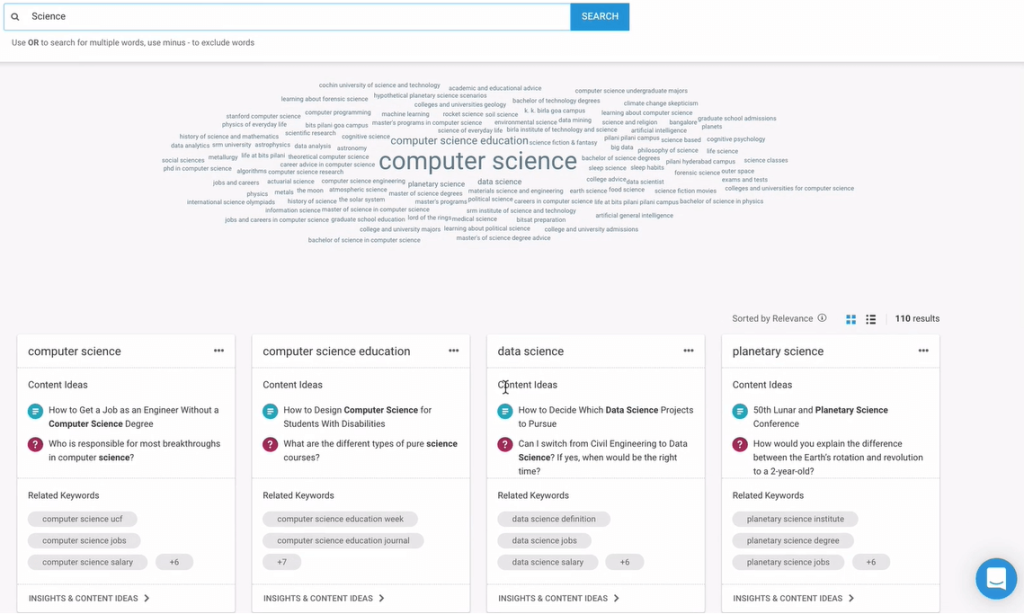
What’s super awesome about the BuzzSumo Keyword Research Tool is that it gives you the option to toggle between related keyword searches and analytics.
This means you can type in a search string and find out what other phrases are related to that topic.
Likewise, you can view any channel on YouTube to analyze its content.
It’s a great two-for-one approach to choosing the right keywords for your content.
5. Keyword Tool for YouTube

The generic name might lead you to think that this is a tool made by YouTube itself, but the truth is that it is just a robust third-party option.
Keyword Tool for YouTube helps analyze specific search strings to give you hundreds of related options.
In the paid version of the program, you can also analyze traffic for specific phrases.
6. TubeBuddy
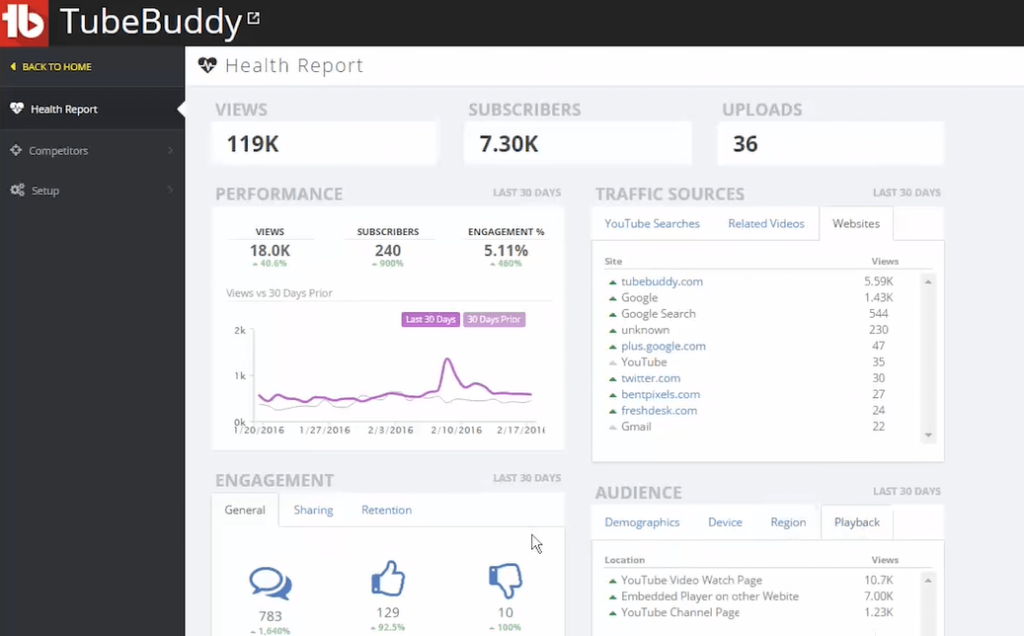
Another excellent YouTube keyword research tool is TubeBuddy.
This browser extension makes it easy to find and select the right keywords for your videos, descriptions, titles, and more.
Plus, it also includes an auto translator function for content in different languages, which is helpful if you’re looking to expand to a wider audience.
7. VidIQ
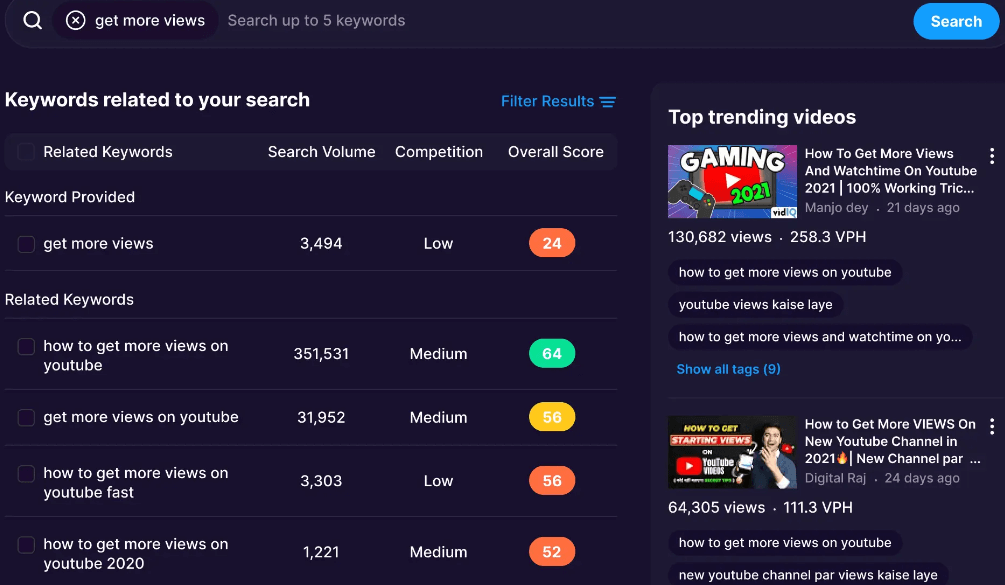
Deemed as one of the best paid YouTube keyword research options on the market, VidIQ makes it super easy for content creators to do the necessary research for video marketing success.
It offers tons of great features like keyword templates that are handy when creating multiple videos, a keyword translator, and so much more.
In addition, they’re also YouTube certified and have an online learning academy to help you best use the platform.
8. Ahrefs
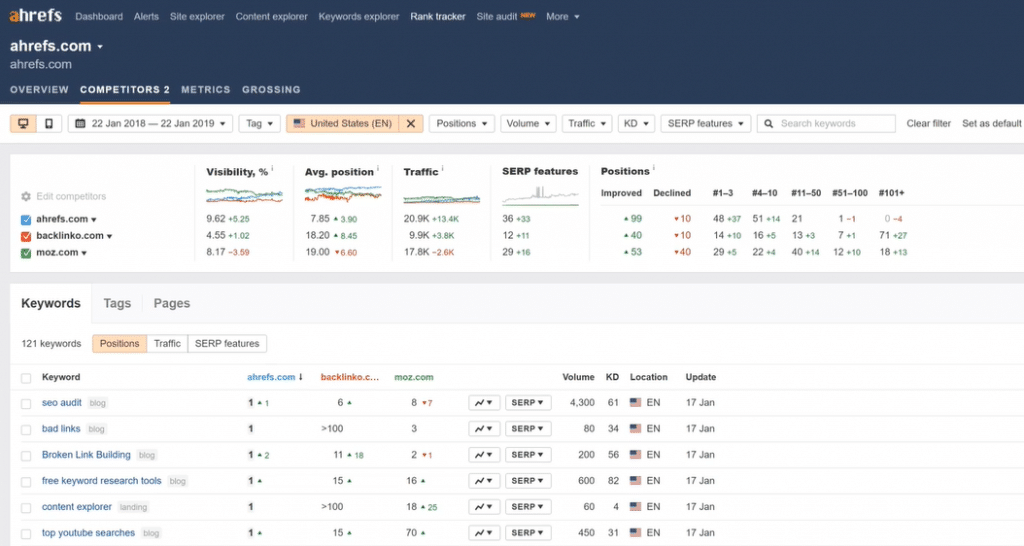
If you really want to learn how to find trending keywords on YouTube that work, a robust YouTube keyword research tool like Ahrefs is an absolute must.
Instead of making educated guesses, it consistently processes large volumes of real on-platform data, the better to present you with genuinely effective search phrases for any keyword you can think of.
9. YouTube Keyword Tool
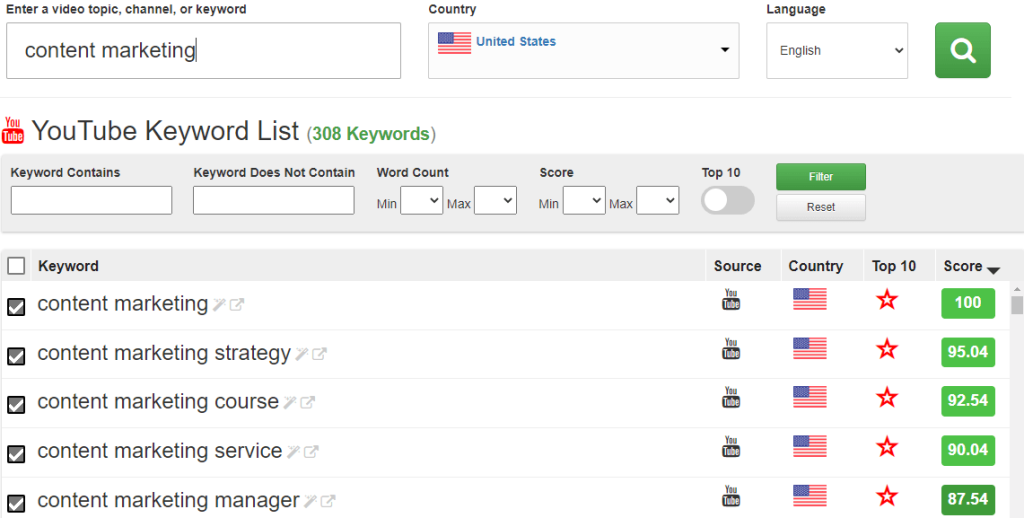
Looking for a budget-conscious but effective way to smash your keyword research for YouTube? YouTube Keyword Tool is a free YouTube keyword analysis tool that couldn’t be simpler to use.
Just enter your target topic or keyword, add any further specifications you might have, and that’s all it takes to get an extensive list of viable options to choose from.
10. SEMRush
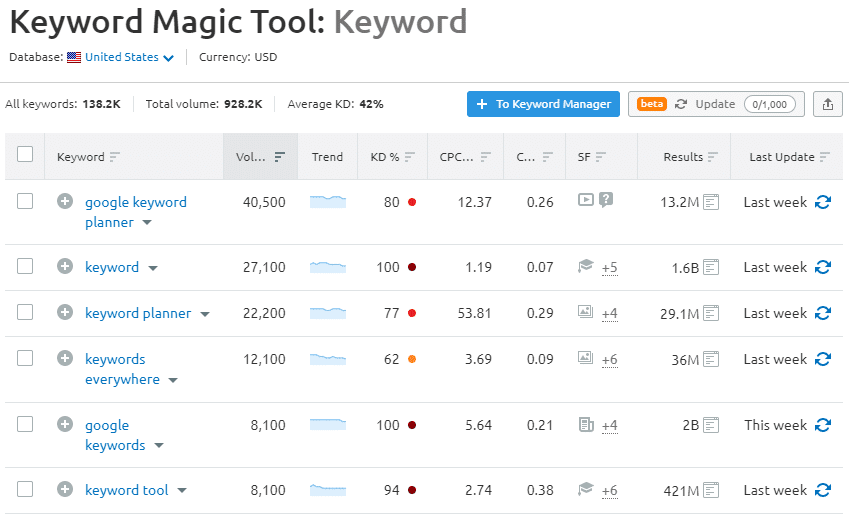
If you’re a believer in great keyword research tools, then SEMRush is likely already on your radar. It’s also high time you knew it can help you get your YouTube keyword research done.
Search a comprehensive database of popular keywords, and put together dynamic master lists of top options.
Then discover a wide range of effective long-tail keywords to take your optimization efforts to the next level.
Here is some extra and valuable advice from Brian Dean:
Other Important YouTube SEO Tips to Remember
What happens after you’ve done the YouTube keyword research and are ready to post your video?
There are certain elements that you want to make sure you pay attention to in order to get the maximum number of benefits from all of that hard work.
Add the keyword to your title and description
It probably goes without saying, but we feel we need to include it here anyway. You want to make sure you add your keywords to your title and description fields on your video.
This will make it easy for both YouTube and Google to know what your content is about.
As a bonus tip, use the keyword as close to the beginning of your title as you can without it looking forced.
Name your file as your primary keyword
You might not think it matters, but it is still super important to match the name of the file you upload to your chosen YouTube keyword.
Doing this gives the platform a good idea of what your content is going to be about, which can make it easier to rank for certain niche terms.
Use closed captions
Closed captions are crawlable by search engines.
This means that by simply including the keyword in your video and then turning on this option, you can improve your visibility.
Pretty neat, right?
What’s even better is that you’re also making it easier to reach your audience, who might depend on these captions to be able to enjoy your content.
Share your content (and include your primary keyword)
Just like with traditional SEO, it is super important to work on off-page backlinks, too.
Make sure you’re sharing your videos on places like Facebook, Twitter, Pinterest, and wherever else it fits. Add your keyword to your post description to help boost the process.
Try keyword mapping
Keyword mapping is the practice of pairing specific pieces of content with relevant keywords and then organizing those pairs within a spreadsheet or chart.
It helps you keep track of which target keywords you’ve already got content for, as well as helps you plan future content effectively.
It also works just as well for YouTube videos as it does blog articles, tutorials, or any other type of content. Just be sure to focus on ensuring each video is optimized for different keywords to avoid competing against your own content.
Figure out search intent
Understanding search intent is crucial when it comes to any thorough keyword research effort.
This means not only knowing which key terms YouTube users are searching for but also zeroing in on what type of content they expect to see in an associated search.
You can get a great idea of a particular user’s search intent by simply going to YouTube, entering trending keywords, and seeing what type of content is trending for that search.
What do the results tell you about where these searchers are in the sales funnel? How can you meet their needs better than your competition is already doing?
Make use of YouTube hashtags
Hashtags have been an insanely popular way social media users zero in on the type of content they want to see for a while now, and they’re definitely in use on YouTube.
That said, every YouTube keyword research strategy should include hashtag use to at least some extent.
However, it’s also important to note that hashtags will only help your efforts if they’re genuinely relevant to your topic.
If they do, you can trust that your videos will appear in more YouTube searches for more people than they would otherwise.
You may also be interested in these articles:
- Why is YouTube Paying Podcasters to Make Videos For Their Platform?
- How to Make a YouTube Short in 5 Easy Steps
- Branding YouTube Campaigns Can Now Bring Sales
Wrap Up
By taking control and using specific words and phrases as part of your descriptions, you can help increase traffic and grow your channel audience.
The cool thing about learning search engine optimization is that the skills easily transfer from one platform to another.
Once you get the process of how to find keywords that match up to what people are searching for and have the plan to create quality content on that topic, you’re able to repeat the process on nearly any digital marketing channel.
Even that new social media platform that just popped up.
And speaking about quality content, WriterAccess is the perfect platform to help you streamline your content production, combining the efficiency of AI with the creativity of human writers.
Why not give WriterAccess a try today? Sign up now and get 14 days of free access to our network of expert writers. Discover for yourself what great content can do for your business!
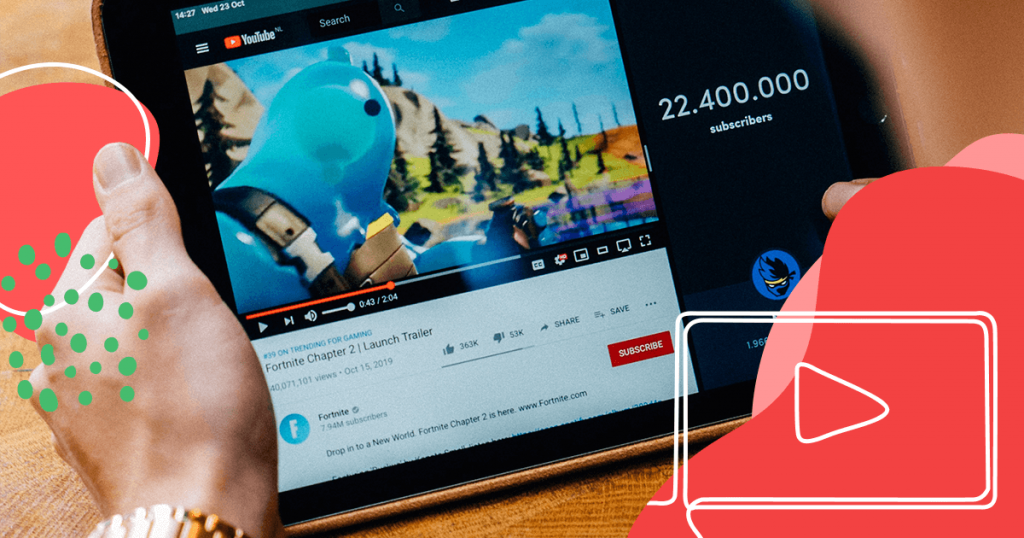

![[Rock NA] State of Marketing Reports 2024 – Comkt Hubspot State of Marketing Report 2024](https://rockcontent.com/wp-content/uploads/2022/07/Banner-Fino-Rock-Convert-2500-%C3%97-500-px-19.png)






